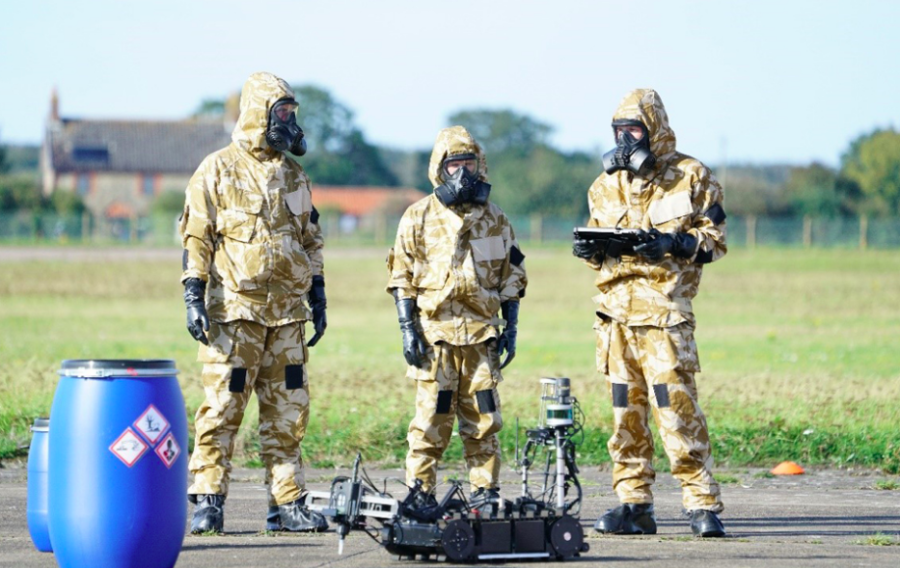
Official DPRTE partner, the Defence Science and Technology Laboratory (Dstl), have successfully trialled a fully autonomous robot that will help defence and security personnel dealing with hazardous scenes.
Dstl scientists have developed a prototype robot so that humans and machines can now share the burden of detecting and report dangerous chemicals over large areas.
The Merlin Robot, developed by industry partner HORIBA-MIRA with funding from the MOD and the Home Office, autonomously carried out simulated chemical reconnaissance tasks over test areas covering up to 10,000 square metres.
Currently a single prototype, the Merlin robot operated continuously on tasks for several hours with ease, allowing personnel to monitor and manage the test incident scene from a safe distance, away from potential harm.
Chemical reconnaissance (recce) on foot and in specially modified vehicles is currently carried out by specialist personnel in the event of suspected or confirmed use of chemical agents, both in military battlefield and homeland security scenarios. It is a dangerous and laborious task requiring high levels of specialist training. In the future, however, autonomous systems could enable the task with significantly less burden on personnel and at lower risk to the deployed teams.
The trial, run under Dstl’s Project Servitus, was a follow-on to successful previous work conducted under Project Minerva, which investigated the use of ground-based and airborne autonomous systems to tackle hazardous scene assessment in areas contaminated with chemical agents, on behalf of the MOD and the Home Office.
Initially developed as part of Project Minerva, under Servitus the Merlin robot had an off-the-shelf chemical vapour sensor mounted so that it can be accurately positioned close to the ground. The robot’s AI-based object recognition and search and detection techniques were also further developed, including drawing on other Dstl-funded work on MIRA’s Viking re-supply and recce unmanned ground vehicle (UGV), enhancing the system’s autonomous behaviours and capability.
The Servitus trial tested different autonomous behaviours for search and mapping operations in exploring an area, obstacle avoidance and chemical mapping. The operationally realistic trial was undertaken with support from specialist C-CBRN operators from 27 Squadron RAF Regiment RAF Honington.
Non-toxic chemical simulants were sprayed onto the ground within a simulated operational activity, and both the military recce teams and the robot undertook the task of searching the areas to find and map the chemicals and plot clean routes.
27 Squadron RAF Regiment operators were provided with basic training on the Merlin and its tablet-based human machine interface, and given the opportunity to operate the robot, setup Merlin missions, monitor progress and re-task the robot as required. The users were quickly able to absorb the training and become proficient in commanding the robot, relishing the chance to work with the system.
Commenting on working with Dstl and MIRA, a spokesperson from 27 Squadron RAF Regiment said: “It was a hugely interesting project to be part of within the early development stages, and it was a pleasure to work alongside the MIRA and Dstl personnel who were very engaged, approachable and keen to listen to our observations and experience. The system has a lot of potential and testing our personnel against the AI of the robot was a good benchmark.”
By the end of the trial, Merlin had successfully demonstrated autonomous operation in area recce tasks that were both clean and contaminated, and had performed tasks to find clean routes through contaminated areas. Throughout the trial the embedded AI was pushed to the limits of object and obstacle recognition and successfully demonstrated its utility within a cluttered environment.
Dstl’s project technical lead, Andy Martin said: “Project Servitus has demonstrated the clear potential to make the job of military and emergency services users safer, more effective and future looking. The technology has significant potential in a number of fields, and work to explore the exploitation pathways within CBR and elsewhere is well underway. Building on Project Minerva, Servitus is another exemplar of cross-department and industry collaboration, with close working between government technical experts, industry and the military user community. It has been highly successful because of that.”
Dstl are official event partners of DPRTE 2021
With DPRTE 2021’s Booking Confidence Guarantee you can now prepare to join the UK’s defence procurement community at DPRTE 2021.
Defence Online is the official media partner for DPRTE 2021
If you would like to join our community and read more articles like this then please click here
autonomous robot Defence Science and Technology Laboratory DPRTE Dstl hazardous scenes






